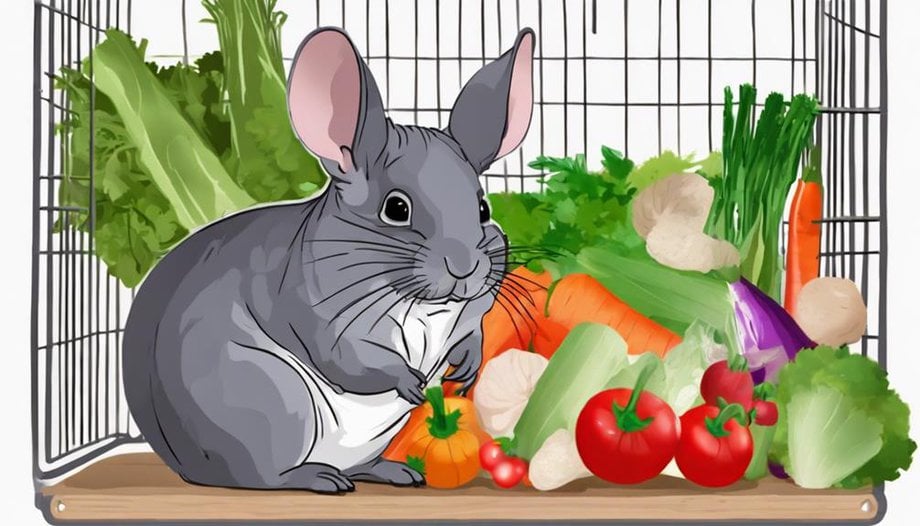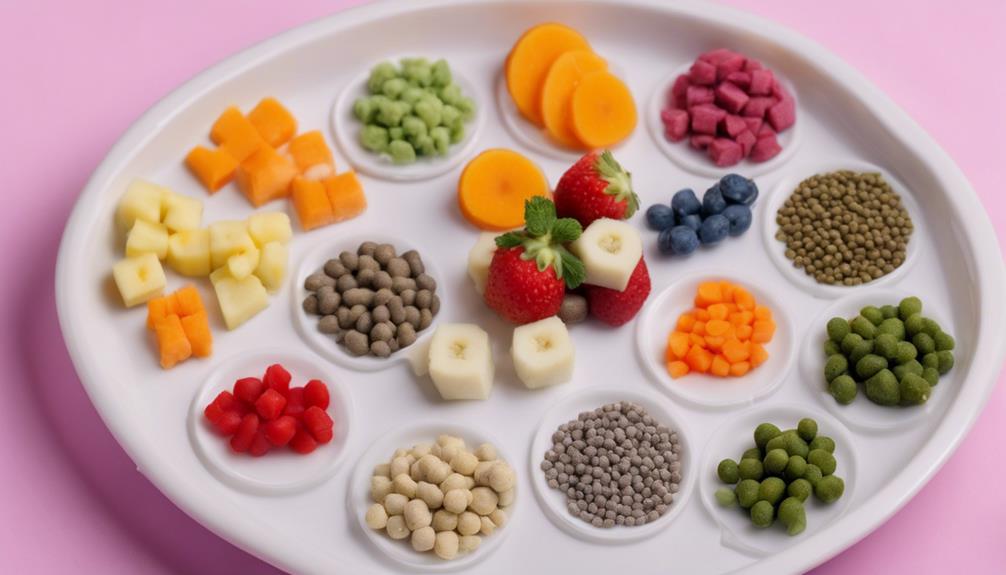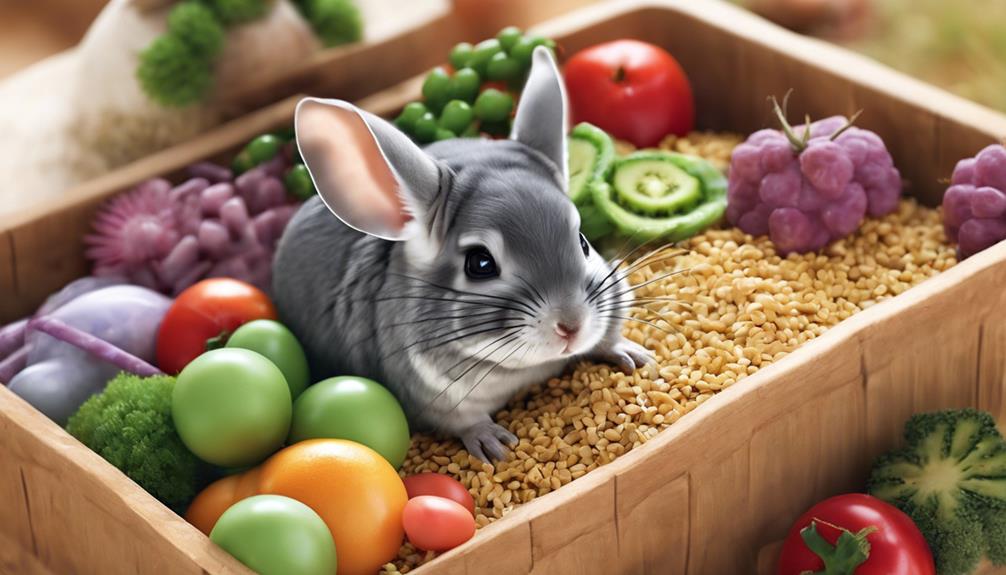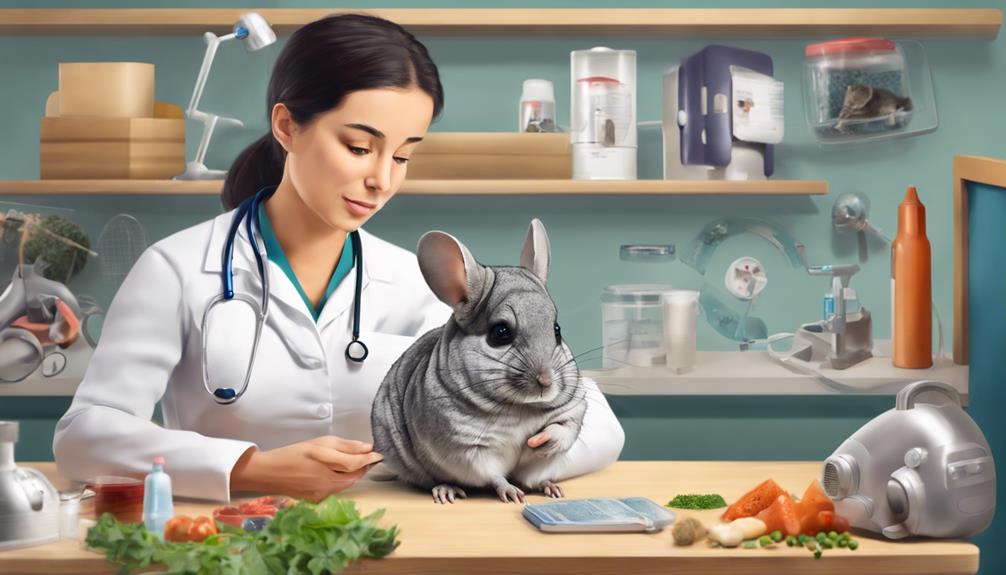How to Manage Your Chinchilla's Diet During Recovery From Illness

When a chinchilla is recovering from an illness or surgery, it is crucial to pay close attention to its diet. Providing the right nutrition can help speed up the recovery process and ensure your pet regains its strength and health.
One key aspect of managing your chinchilla's diet during recovery is to offer easily digestible foods. This may include hay, fresh vegetables, and a small amount of pellets. Avoid giving treats or foods high in sugar or fat, as they can be too heavy for a recovering chinchilla's sensitive digestive system.
It is also important to provide access to fresh water at all times. Dehydration can worsen an already weakened state, so make sure your chinchilla is drinking enough water. Monitor its water intake closely and consider offering water-rich vegetables like cucumber or lettuce if necessary.
In some cases, your veterinarian may recommend specific dietary changes or supplements to support your chinchilla's recovery. Follow their advice closely and keep them informed of any changes in your pet's condition. With proper care and attention to its diet, your chinchilla will be on the road to recovery in no time.
Importance of Proper Nutrition
Ensuring your chinchilla receives the proper nutrition is paramount for their recovery and overall well-being. Nutritional balance plays an important role in aiding your little friend's journey to health.
Understanding the significance of dietary adjustments is critical during this period. Your chinchilla's diet should consist of high-quality hay, fresh vegetables, and a limited amount of pellets to maintain the necessary balance of nutrients.
Monitoring their food intake closely, making sure they're getting the right amount of vitamins and minerals, is crucial. By providing a well-rounded diet, you're actively contributing to their healing process and promoting a healthy lifestyle.
Hydration Is Key
Nourishing your chinchilla with ample water is crucial for its recovery journey. Remember, hydration is the key to supporting your pet's well-being during this time.
Pay close attention to signs of dehydration to guarantee your chinchilla stays healthy.
Water Intake Importance
To maintain your chinchilla's health and aid in their recovery, ensuring they've sufficient water intake is essential. Hydration levels play an important role in the recovery process, providing essential support for your furry friend's well-being.
Water is a precious elixir, a source of life and rejuvenation for your chinchilla. As you care for your beloved pet during this delicate time, remember that offering fresh water daily is a simple yet powerful act of kindness. Your chinchilla relies on you to provide this basic necessity, fostering their strength and resilience.
Signs of Dehydration
In the journey of caring for your chinchilla's well-being, recognizing the subtle signs of dehydration is an important step in ensuring their recovery path stays smooth and steady. Maintaining proper hydration levels is vital for their health and vitality.
Here are some key health indicators to help you identify dehydration in your furry friend:
- Dry or sticky gums: Check your chinchilla's gums regularly for moisture.
- Sunken eyes: Dehydration can cause the eyes to appear sunken or dull.
- Loss of skin elasticity: Gently pinch your chinchilla's skin; if it doesn't bounce back quickly, it may indicate dehydration.
- Lethargy or weakness: A lack of energy could be a sign that your chinchilla needs more fluids.
Introducing Soft Foods

Consider incorporating gentle and easily digestible foods into your chinchilla's diet as it switches to a softer meal plan during the adjustment period.
A gradual change to these nutrient-rich options is key in supporting your little one's healing journey. Begin by offering small amounts of soft hay, such as timothy hay, to introduce variety and aid in digestion.
Pellets can be moistened slightly to make them easier to chew, ensuring your chinchilla receives the essential nutrients it needs. Additionally, vegetables like squash or carrots, finely chopped and served in moderation, can provide added vitamins and minerals to boost recovery.
Remember to adjust the feeding schedule accordingly, offering these soft foods in small portions throughout the day. By being mindful of these dietary changes and selecting foods that are gentle on the stomach, you're providing the best care possible for your chinchilla during this critical period of recovery.
Monitoring Food Intake
As your chinchilla continues on the path to recovery, ensuring a vigilant eye on their food intake becomes paramount. Here are some key points to to consider:
- Portion Control: Offer measured amounts of food to prevent overeating and aid digestion.
- Meal Frequency: Spread out their meals throughout the day to maintain energy levels and prevent digestive issues.
- Nutrient Balance: To consider a well-rounded diet with a mix of hay, pellets, and fresh vegetables to support their recovery.
- Weight Management: Monitor your chinchilla's weight regularly to track progress and adjust their diet as needed.
Avoiding Sugary Treats

Nourish your chinchilla wisely by limiting sugary treats and opting for the goodness of hay. Remember, excessive sugar can lead to digestive issues and weight problems in your furry friend.
Choose health and vitality for your chinchilla by making mindful choices in their recuperation diet.
Limit Sugary Snacks
To support your chinchilla's recovery, prioritize feeding them nutritious, low-sugar snacks to avoid any potential setbacks in their health. Remember, their well-being is in your hands.
Here are some essential tips to help you limit sugary snacks:
- Fresh Vegetables: Offer a variety of fresh veggies like bell peppers, carrots, and leafy greens.
- Timothy Hay: Provide unlimited access to high-quality hay to aid digestion and keep teeth healthy.
- Limited Fruits: Limit sugary fruits like grapes and bananas to occasional treats.
- Nutritious Pellets: Choose high-fiber, low-sugar pellets to guarantee a balanced diet.
Opt for Hay
Limiting sugary snacks is key to managing your chinchilla's diet during recovery. By opting for hay instead, you can provide a nutritious alternative that supports their well-being without compromising their health.
Hay alternatives offer the necessary fiber for proper digestion and dental health, ensuring your chinchilla receives essential nutrients for a balanced diet. During the recovery process, dietary considerations play a critical role in aiding your chinchilla's health journey.
Steering clear of sugary treats and focusing on hay will help maintain nutritional balance and aid in their overall well-being. Remember, choosing hay over sugary snacks is a wise decision that serves your chinchilla's recovery process best.
Your chinchilla will thank you for nourishing them with what's truly beneficial.
Providing Vitamin Supplements
Consider incorporating a balanced vitamin supplement into your chinchilla's recovery diet to aid in their healing process and overall well-being. Providing essential vitamins during this sensitive period can help support your chinchilla's immune system and promote faster recovery.
Here are some tips for incorporating vitamin supplements into your chinchilla's diet:
- Choose a reputable chinchilla-specific vitamin supplement: Confirm the supplement is specifically designed for chinchillas to meet their unique nutritional needs.
- Follow the recommended dosage: Avoid over-supplementing, as excess vitamins can be harmful. Stick to the guidelines provided on the supplement packaging or as advised by your veterinarian.
- Mix the supplement with their food: Blend the recommended amount of supplement with their pellets or hay to ensure they consume it consistently.
- Monitor their response: Keep an eye on your chinchilla's health and behavior to assess how they're responding to the vitamin supplement. Adjust the dosage if needed based on their recovery progress.
Consulting With a Vet

When seeking guidance on your chinchilla's recovery, consulting with a veterinarian is crucial to guarantee the best care and support for your furry friend. Your vet can provide tailored advice based on your chinchilla's specific needs, ensuring proper post-illness care and dietary adjustments. They'll assess your chinchilla's recovery progress and recommend any necessary dietary restrictions to aid in the healing process.
During this critical time, your vet's expertise can make a significant difference in your chinchilla's recovery journey. By consulting with them, you can gain valuable insights into how to best support your chinchilla's health and well-being. Your vet may suggest changes to your chinchilla's diet to accommodate their recovery needs, such as increasing certain nutrients or avoiding foods that could hinder their progress.
Frequently Asked Questions
Can I Feed My Chinchilla Human Food While It Is Recovering From Illness?
While your chinchilla is recovering from illness, it's best to avoid feeding them human food. Focus on providing dietary supplements and ensuring a nutritional balance through their regular chinchilla diet to support their recovery.
How Long Should I Wait Before Reintroducing Its Regular Diet After Recovery?
When it's time to reintroduce your chinchilla's regular diet after recovery, remember that slow and steady wins the race. Gradual reintroduction and diligent dietary monitoring are key. Your patience will be rewarded with fluffy joy!
Are There Any Specific Fruits or Vegetables That Are Better for a Chinchilla During Recovery?
During recovery, provide your chinchilla with nutritious treats like some raisins or dried herbs. Incorporate balanced supplements to aid in its healing journey. Remember to consult your vet for tailored advice on the best foods.
Can I Mix Medication With My Chinchilla's Food to Help It Take Its Medicine?
You can mix medication with your chinchilla's food to help with administration. Make sure it's fully consumed. Consult a vet for guidance. Consider adding nutritional supplements to aid recovery. Love and care will see your chinchilla through.
How Do I Know if My Chinchilla Is Getting Enough Nutrients From Its Diet During Recovery?
Oh dear pet owner, ensuring your chinchilla gets enough nutrients during recovery is essential. Monitor weight, provide nutritional supplements, and maintain a balanced diet with a consistent feeding schedule. Your furry friend's health is in your caring hands.











